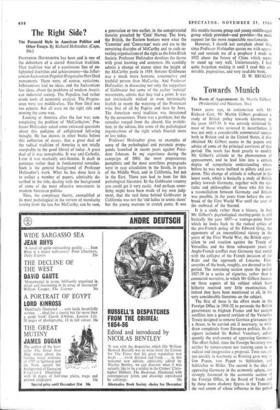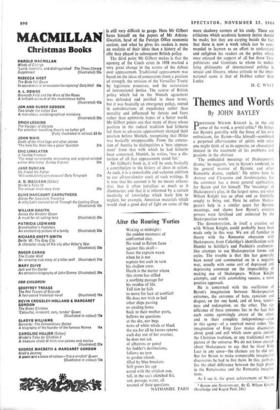Towards Munich
THREE years ago, in conjunction with Mr Richard Gott, Mr Martin Gilbert produced a study of British policy towards Germany in the years 1937-39. It was severely criticised by most of those who reviewed it; nevertheless, it was not only a considerable commercial success both in Britain and in the United States, it also obtained Mr Gilbert access to the papers and advice of some of the principal survivors of that period. The result has been greatly to modify Mr Gilbert's attitude to the phenomenon of appeasement, and to lead him into a certain degree of sympathetic understanding where before he was more inclined to pillory and con- demn. This change of attitude is reflected in his latest work, which is basically a study of British policy towards Germany, together with the atti- tudes and philosophies of those who felt that a reconciliation between Germany and Britain was possible, in the years from before the out- break of the First World War until the year of the outbreak of the Second.
It is a study rather than a history, in that Mr Gilbert's psychological starting-point is still basically the year 1937—a vantage-point from which he looks back to the radical critics of the pro-French policy of Sir Edward Grey, the opponents of an unconditional victory in the years of the First World War, the British oppo- sition to and reaction against the Treaty of Versailles, and the three subsequent years of Anglo-French conflict over Germany that ended with the collapse of the French invasion of the Ruhr and the approach of Locamo. Five- sevenths of the book, roughly, are devoted to this period. The remaining section spans the period 1927-39 in a series of vignettes, rather than a connected narrative, in which Mr Gilbert focuses on three aspects of his subject which have hitherto received very little examination, if indeed they have been mentioned at all, in the very considerable literature on the subject.
The first of these is the effort made in the Foreign Office in 1931-32 to persuade the British government to frighten France and her eastern satellites into a general revision of the Versailles Treaty designed to remove German grievances by a threat, to be carried out if necessary, to with- draw completely from European politics. Its de- signers included Sir Robert Vansittart, subse- quently the arch-enemy of appeasing Germany. The effort failed, since the Foreign Secretary was neither by temperament nor training open to so radical and imaginative a proposal. Time ran out too quickly in Germany as Bruning gave way to ion Papen, von Papen to Schleicher, and Schleicher to Hitler. The second is the idea of appeasing Germany in the economic sphere, one strongly favoured in • the economic section of the Foreign Office, in the Board of Trade and by those more shadowy figures in the Treasury, the real extent of whose influence in this period
is still very difficult to gauge. Here Mr Gilbert bases himself on the papers of Mr Ashton- Gwatkin, head of the Foreign Office economic section; and what he gives his readers is more an analysis of their ideas than a history of the role they played in subsequent British policy.
The third point Mr Gilbert makes is that the opening of the Czech crisis in 1938 marked a very great change in the nature of the debate over appeasement. Traditional appeasement was based on the ideas of concessions from a position of strength, the revision of the Versailles Treaty by legitimate processes, and the restoration of international justice. The course of British policy which led to the Munich agreement was defended and justified in those terms; but it was basically an emergency policy, rooted in considerations of expediency rather than morality and influenced by threats and fears rather than optimistic hopes of a better world. Mr Gilbert points out that many of those whose position in the radical tradition had hitherto led them to advocate appeasement changed their position before Munich, recognising that Hitler was basically unappeasable. From the annexa- tion of Austria he distinguishes a 'new appease- ment' from that with which he had hitherto been concerned. Munich, he writes, 'was a dis- tortion of all that appeasement stood for.'
Mr Gilbert's book is, it will be seen, basically a contribution to the history of ideas in action. As such, it is a remarkable and welcome addition to our all-too-slender stock of such writings. It is true that his account is by no means exhaus- tive; that it often tantalises as much as it illuminates; and that it is informed by a certain insularity of knowledge which leads him to neglect, for example, American materials which would shed a good deal of light on some of the more shadowy corners of his study. These are criticisms which academic honesty insists should be made; but they are carping beside the fact that there is now a work which can be com- mended to laymen as an effort to understand and enlighten his readers on the policy which once enjoyed the support of all but those Tory politicians and historians to whom its under- lying philosophy of international politics is unreal and illusory, whose attitude to the inter- national scene is that of Hobbes rather than Locke.
D. C WATT















































 Previous page
Previous page